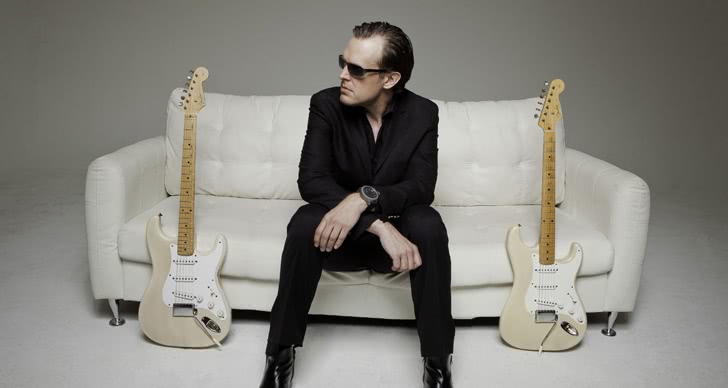Who doesn’t enjoy a serenade? When I speak with Joe Bonamassa he is kicking back on his patio, answering scores of questions with the amused patience of someone who has long grown accustomed to the inevitable media dredge that accompanies a new album.
While his focus is chiefly on the interview, every now and again his attention wavers to the Gibson he constantly plays and conversation will pause while a particular run of notes is teased out.
When one thinks of the blues, the prevailing image seems to be of a dimly lit figure sitting on a fire escape in some New York City back alley, wearing sunglasses in the middle of the night and smoking crumpled cigarettes while a lonesome melody drifts from the street below. Their heart is broken, their coat is torn, instrument in hock; the tried and true ingredients. For Bonamassa, however, the reality is not quite so despairing.
“Well, I can only speak for myself, and I don’t really get out much,” he happily admits. “But I’m a guitar nerd. Right now I’m wearing a Fender shirt, playing a Gibson Les Paul, and on the computer screen in front of me I’m on a guitar site looking to buy something. That’s basically me in a nutshell. It’s not exactly Hollywood. Though I am meeting my keyboardist later and the drummer from KISS, my guitar tech, and we’re all going to the Rainbow. We’re going to sit there with other pretend rock stars, and we’re going to pretend that we’re pretend rock stars. It’s kind of a third-tier thing. There’s actual rock stars, then the pretend rock stars who hang out at the Rainbow, and then there’s us. But that’s it! After that we’ll all come back to the house and geek out. No fire escape.”
As guitar geeks go, Bonamassa would have to be sitting pretty close to the top. Counting live releases he now has 22 albums under his belt, and owns 125 guitars. Of those, there are some which are played once and then never venture out from their case again. Others are played every day. Like many guitarists, the impression you have of their relationship with their instrument is that it’s an extension of themselves, like a detachable limb.
“Most people want to romanticise performing, make it deeper than it really is,” says Bonamassa. “I’m often asked what I’m thinking when I’m onstage playing, and half the time I’m thinking about where I want to go to lunch the next day, and the other half I’m thinking about what guitar shops I’m going to hit if we have time off. I mean, there’s a deep music meaning to a lot of this stuff, but a lot of it is ingrained into your DNA, so your focus when you’re up onstage, or writing or recording, well, your mind can wander, just like in anything else. It’s amazing what muscle memory can do, you know,” he laughs.
While he has been chalking up the accolades for years now (including 12 number one Billboard Blues albums, more than anybody else – Clapton, Vaughan and B.B. King included), Bonamassa only found himself with his first Grammy nomination last year for his second album recorded with Beth Hart, Seesaw.
“Well, the whole thing was a real honour. We lost to Charlie Musselwhite and Ben Harper, and both of those guys are just legends at what they do so that wasn’t a problem at all. The winner gets the Grammy, but everyone who is nominated is sent this really nice Tiffany medal of honour that says, ‘Congratulations, you’ve lost to somebody who is better and whose star shines brighter than yours!’” he laughs. “It’s really cool, but the thing that I was mostly thrilled about was the fact it was great for Beth Hart, who has been criminally underrated her entire career, and it’s her first Grammy nomination too. We didn’t win, but we didn’t go down without a fight. Though I also knew that Ben and Charlie were going to be playing on the night, so I thought, ‘Nope, not moving anything off the mantelpiece just yet. Keep that little Fender catalogue right where it is.’”
He breaks off to play another riff, and I’m content just to listen; several times throughout this interview I feel like a fly on the wall. There is never the sense of Bonamassa being guarded about his music, or cagey about his inspirations and processes behind whatever magic makes it all work. In the end, he just seems like a guy who has found a way to keep doing what he loves.
“I don’t have any fears about what I do because I’m really just a musical nomad,” he says, then thinks for a moment. “I don’t fear that whatever reputation I have now will be tarnished if I decide to throw a curveball, because I’ve already been throwing curveballs my whole career. It only ever matters to me, to what I think. The fans, you know, the fans basically will tell you very quickly if they like your work or not. I mean, you’re always going to get the token asshole who’s going to dislike everything you do, and always be that constant contradiction to anything you have to say. If the sun is shining, it’s actually raining. That kind of thing. But you’ll always get an immediate reaction from the fans whether they like something or not.
“You always have to please yourself, but I have to think about them as well. You never want to be that artist who’s up there lamenting, ‘Oh, if only they knew the real me.’ Well, this is the real me. Fender shirt, playing a nice guitar. I’m a nerd who plays blues. And that’s OK.”
Different Shades Of Blueis out Tuesday September 23 throughJ & R Adventures. Catch Bonamassa attheState Theatre onSunday September 14, tickets through Ticketmaster.


































